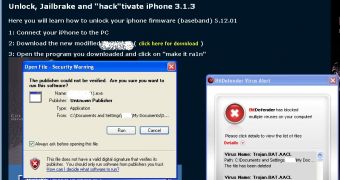As if there weren’t enough scams targeting naive iPhone users eager to unlock their devices, a malware-spreading mechanism targeting the iPhone-unlocking fanbase has been discovered by BitDefender. The company’s Mihai Andrei Livadariu, virus researcher, has provided malwarecity.com with some information on the Trojan, identified by BitDefender as Trojan.BAT.AACL.
“This is how the story goes,” Ioana Jelea writes for MalwareCity, a BitDefender initiative for the software security community and a free resource for those interested in their online security. “You receive an e-mail in which you find out that you might get your hands on a new version of an iPhone unlocking application which basically allows you to overcome vendor set network restrictions. All you have to do is….yes, click a link that will take you to the web page on which the technical wonder awaits you,” Jelea writes.
“As you get further on into the maze of this scheme and actually click the link, you land on a web page which provides instructions to be followed in order to download the unlocking application,” she reports, based on technical information made available courtesy of Mihai Andrei Livadariu.
“First off, you are to connect the iPhone to the PC, then download ‘the new modified’ application and run it on the iPhone,” the detailed overview of the process goes. “And that’s when the magic begins: once downloaded and run, the executable opens up the way for a nice Trojan to fester on your PC.”
MalwareCity notes that this piece of malware, identified by BitDefender as Trojan.BAT.AACL, comes as a Windows batch (.bat) file packed alongside the iPhone jailbreaking application. The author forgets to mention which one exactly, but the screenshots provided reveal that it's geohot's Blackra1n. The report then goes to detail the consequences of getting infected. Imagery is also provided in the report, including the download page of the alleged iPhone unlocking application (available above; click on it for a larger view).
Note: It goes without saying that Mac users remain unaffected by this piece of malware. However, there are several other kinds of scams that everyone should be on the lookout for. More on this here.

 14 DAY TRIAL //
14 DAY TRIAL //